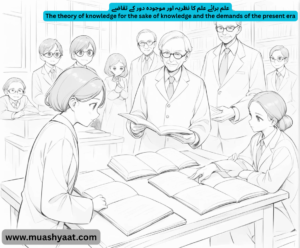تعلیم دینے کے عظیم تر مفاد ⇐ بچوں کو تعلیم دینے کے عظیم تر مفاد کے پیش نظرہ کم اہم تعلیمی سرگرمیوں کو ایک مناسب وقت تک کیلئے التواء میں رکھا جا سکتا ہے۔
The greater benefits of teaching Less important educational activities may be postponed for an appropriate period of time in the greater interest of educating children.
نفسیاتی اصولوں کے مطابق
طالبات کو اور ان کے والدین کے معاشرتی ماحول کو نفسیاتی اصولوں کے مطابق سمجھنا ضروری ہوگا اور طالبات کو موزوں دیتے رویوں کی تربیت دیتے ہوئے معاشرتی معمولات کے پیش نظر حکمت عملی طے کرنا پڑے گی۔
According to psychological principles
It will be necessary to understand the social environment of the students and their parents according to psychological principles and while training the students in appropriate behaviors, strategies will have to be formulated in view of social norms.
تعلیم کا اقتصادی پہلو
تعلیم ایک معاشرتی عمل ہے۔معاشرہ یہ چاہتا ہے کہ سکول میں جانے والے بچے معاشی طور پر یا عزت زندگی گزارنے کے ساتھ ساتھ معاشرے کی معیشت کو بھی ترقی دیں۔ معاشرہ یہ تقاضا کرتا ہے کہ تعلیم بچوں کیلئے حصول معاش کا ذریعہ بھی ہے تاکہ وہ دوسروں پر بوجھ نہ بنیں ۔
Economic Aspects of Education
Education is a social process. Society wants children who go to school to live economically or with dignity, as well as to develop the economy of the society. Society demands that education is also a means of earning a living for children so that they do not become a burden on others.
علم برائے علم کا نظریہ اور موجودہ دور کے تقاضے
علم برائے حصول مرت علم برائے تعمیر کردار اور علم برائے تشکیل معاشرہ جیسے نظریات اپنی جگہ درست ہیں لیکن تعلیم کا اہم مقصد معاشی ترقی بھی ہے۔ وہ دن گئے جب تعلیم کو محض ذہنی ارتقاء سمجھا جاتا تھا۔ تصور یہ تھا کہ تعلیم پر جو بھی خرچ ہوتا ہے اس کا مادی فائدہ نہیں ہوتا۔
The theory of knowledge for the sake of knowledge and the demands of the present era
Theories like knowledge for acquiring knowledge, knowledge for building character and knowledge for shaping society are correct in their place, but the main purpose of education is also economic development. Gone are the days when education was considered merely for mental development. The idea was that whatever is spent on education does not yield any material benefit.
ترقی یافتہ معاشرے
آج کے دور میں ترقی یافتہ معاشرے ہوں یا ترقی پذیر معاشرے اس بات کا اچھی طرح احساس رکھتےہیں کہ تعلیم کا نتیجہ ہماری منفعت کی صورت بھی ملتا ہے۔ برطانیہ میں مفتی انقلاب کے بعد تعلیمی ترقی کا ایک نیا باب کھلا 1850ء کے بعد ہونے والی سائنسی ترقی اور سائنسی ایجادات سے حاصل ہونے والے جملہ فوائدان اخراجات کا نتیجہ ہیں جو برطانوی معاشرے نے تعلیم پر کیے۔
Developed societies
In today’s era, whether developed or developing societies, we are well aware that the result of education is also in the form of our benefit. After the Mufti Revolution in Britain, a new chapter in educational development opened. All the benefits derived from scientific progress and scientific inventions after 1850 are the result of the expenses that British society made on education.
تعلیم و تربیت قومی آمدنی میں اضافے کا باعث ہے
کیاتعلیم وتربیت سے قومی آمدنی میں اضافہ ہوتا ہے؟ اس موضوع پر تحقیق نے تحقیقات کیں جن سے مثبت نتائج بر آمد ہوئے۔ ایک مصری ماہر تعلیم اور محقق پروفیسر سولونے انداز ہ لگایا کہ اقتصادی ترقی میں مادی وسائل کا حصہ صرف دس فیصد ہے، جب کہ باقی نوے فیصد ترقی ٹیکنیکی اور سائنسی علوم کی مرہون منت ہے۔
Education and training increase national income
Does education and training increase national income? Research has been conducted on this topic, which has yielded positive results. An Egyptian educationist and researcher, Professor Solow, estimated that material resources account for only ten percent of economic development, while the remaining ninety percent of development is due to technical and scientific knowledge.
پروفیسر ریڈوے
پروفیسر ریڈوے اور پروفیسر سمتھ نے برطانیہ کی صنعتی پیداوار کے متعلق مختلف سالوں کے شماریات کا موانہ کیا اور اس نتیجے پر پہنچے کہ صنعتی پیداوار میں اضافہ کا 25 فیصد حصہ مادی وسائل کا مرہون منت ہے اور باقی 75 فیصد اضافہ صنعتی ایجادات اور سائنسی علوم کا مرہون منت ہے۔ ان تحقیقات سے نتیجہ اخذ کرنے میں کوئی مشکل پیش نہیں آتی کہ اگر کوئی معاشرہ اپنے افراد کی تعلیم پر خرچ کرتا ہے تو اسے مجموعی قومی آمدنی میں اضافہ کی صورت میں اس کا بدل ملتاہے۔
Professor Redway
Professor Redway and Professor Smith examined the statistics of British industrial production for different years and came to the conclusion that 25 percent of the increase in industrial production is due to material resources and the remaining 75 percent is due to industrial inventions and scientific knowledge. There is no difficulty in concluding from these investigations that if a society spends on the education of its people, it gets its reward in the form of an increase in the gross national income.
تعلیم کا انفرادی ترقی پر اثر
ایک سوال یہ ہے کہ کیا تعلیم کی ترقی سے افراد کی انفرادی آمدنی میں اضافہ ہوتا ہے؟ اس موضوع پر بھی تحقیقات ملتی ہیں جن کے نتائج مثبت ہیں اور حوصلہ افزاء بھی۔
The impact of education on individual development
One question is whether the development of education increases the individual income of individuals? There is research on this topic as well, the results of which are positive and encouraging.
تعلیمی اقتصادیات کے موضوع پر تحقیقات
ایک محقق پنسن نے تعلیمی اقتصادیات کے موضوع پر تحقیقات کیں اور معلوم کیا کہ 1960ء میں امریکہ میں دہ تر کھان جو ہائی سکول تک تعلیم یافتہ تھے، ان تر کھانوں سے جو صرف پرائمری پاس تھے۔ 900 ڈالر سالانہ زیادہ کماتے ۔
Research on the economics of education
A researcher named Pinson conducted research on the economics of education and found that in 1960, the average American who had a high school education earned $900 more per year than the average American who had only a primary education.
ہم أمید کرتے ہیں آپ کو “تعلیم دینے کے عظیم تر مفاد” کے بارے میں مکمل آگاہی مل گئی ہوگی۔۔۔
MUASHYAAAT.COM 👈🏻 مزید معلومات کیلئے ہمارے اس لنک پر کلک کریں
ہماری ویب سائٹ پر آنے کیلئےشکریہ




